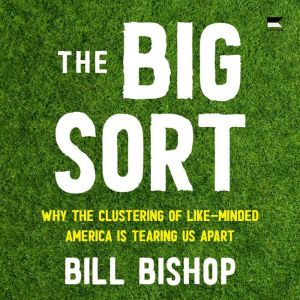

The Big Sort
Why the Clustering of Like-Minded America is Tearing Us Apart
Author: Bill Bishop
Narrator: Graham Halstead
Unabridged: 12 hr 30 min
Format: Digital Audiobook Download
Publisher: HarperAudio
Published: 10/15/2024
Categories: Nonfiction, Political Science, Political Process
Includes:
Bonus Material
![]()
Synopsis
America may be more diverse than ever coast to coast, but the places where we live are becoming increasingly crowded with people who live, think, and vote as we do. This social transformation didn't happed by accident. We’ve built a country where we can all choose the neighborhood -- and religion and news show -- most compatible with our lifestyle and beliefs. And we are living with the consequences of this way-of-life segregation. Our country has become so polarized, so ideologically inbred, that people don’t know and can’t understand those who live just a few miles away. The reason for this situation, and the dire implications for our country, is the subject of this groundbreaking work.
In 2004, the journalist Bill Bishop, armed with original and startling demographic data, made national news in a series of articles showing how Americans have been sorting themselves over the past three decades into alarmingly homogeneous communities -- not by region or by red state or blue state, but by city and even neighborhood. In The Big Sort, Bishop deepens his analysis in a brilliantly reported book that makes its case from the ground up, starting with stories about how we live today and then drawing on history, economics, and our changing political landscape to create one of the most compelling big-picture accounts of America in recent memory.
The Big Sort will draw comparisons to Robert Putnam's Bowling Alone and Richard Florida's The Rise of the Creative Class and will redefine the way Americans think about themselves for decades to come.Supplemental enhancement PDF accompanies the audiobook.

